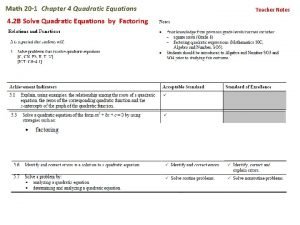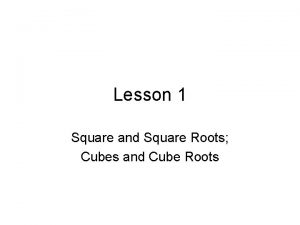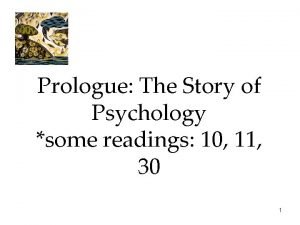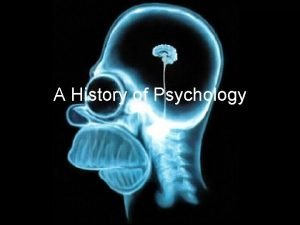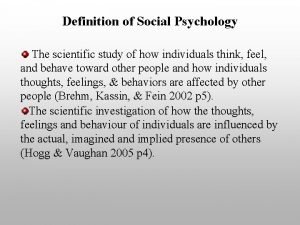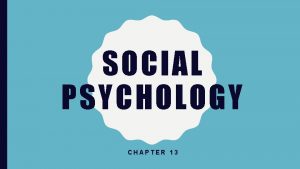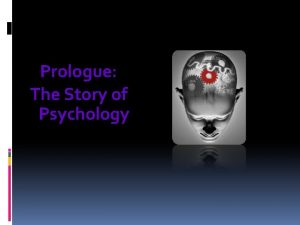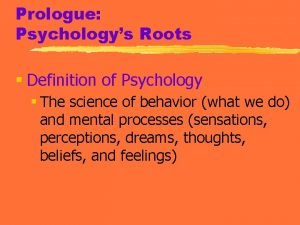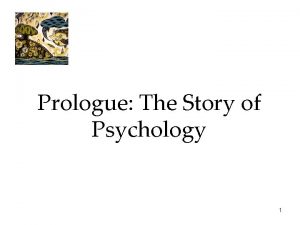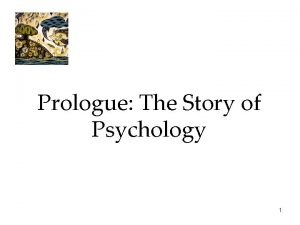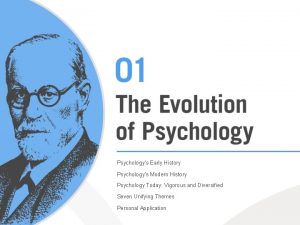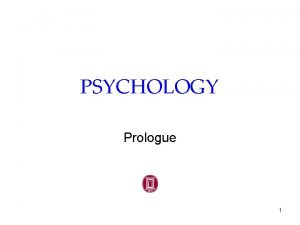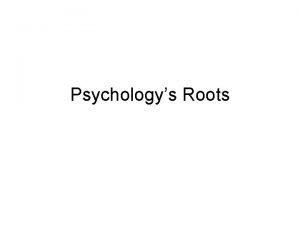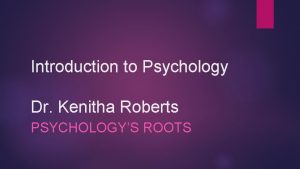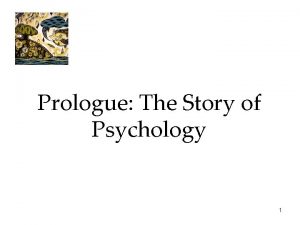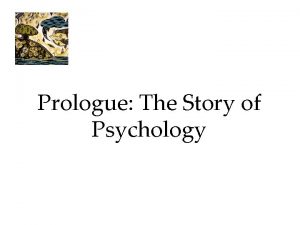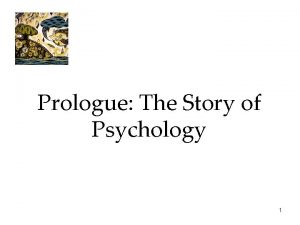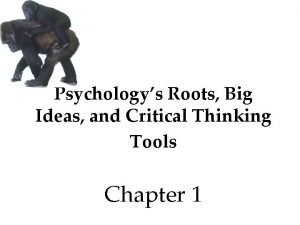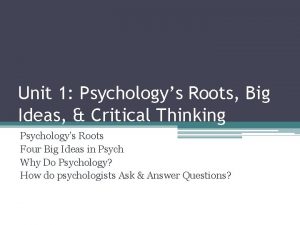Prologue Psychologys Roots Definition of Psychology The science












































- Slides: 44

Prologue: Psychology’s Roots § Definition of Psychology § The science of behavior (what we do) and mental processes (sensations, perceptions, dreams, thoughts, beliefs, and feelings)

History of Psychology z. Although the science of psychology started in the late 1800’s, the concept has been around a lot longer. z. There was evidence of trephination (cutting holes into a skull to let evil spirits out) back in the stone age. It was like a bad SAW movie!!!!

Prescientific Psychology Plato Socrates (469 -399 B. C. ) and Plato (428 -348 B. C. ) Socrates and his student Plato believed the mind was separate from the body, the mind continued to exist after death, and ideas were innate.

Prescientific Psychology Aristotle (384 -322 B. C. ) Aristotle suggested that the soul is not separable from the body and that knowledge (ideas) grow from experience.

Prescientific Psychology Rene Descartes (1596 -1650) Descartes, like Plato, believed in soul (mind)-body separation, but wondered how the immaterial mind and physical body communicated.

Prescientific Psychology John Locke (1632 -1704) Locke held that the mind was a tabula rasa, or blank sheet, at birth, and experiences wrote on it.

Prologue: Psychology’s Roots Psychological Science Is Born § Empiricism § Knowledge comes from experience via the senses § Science flourishes through observation and experiment

Wilhelm Wundt is referred to as the “father of psychology” because in 1879 he started the first laboratory in psychology for studying humans. He broke into parts the elements of feelings and thought. Using a procedure called “introspection” he introduced scientific procedure to study feelings.

Psychological Science is Born Structuralism Titchener (1867 -1927) Wundt (1832 -1920) Wundt and Titchener studied the elements (atoms) of the mind by conducting experiments at Leipzig, Germany, in 1879.

Psychological Science is Born Functionalism Mary Calkins James (1842 -1910) Influenced by Darwin, William James established the school of functionalism, which opposed structuralism.

Prologue: Psychology’s Roots § Functionalism focused on how behavioral processes function- how they enable organism to adapt, survive, and flourish


William James is considered to be one of the founders of American psychology. In 1890, he published Principles of Psychology. The book was 1400 pages long, two volumes in length and it took him 12 years to write. Unlike Wundt, he did not want to break behavior into parts; instead, he never wanted to lose sight of the individual as a whole.

Psychological Science is Born The Unconscious Mind Freud (1856 -1939) Sigmund Freud and his followers emphasized the importance of the unconscious mind and its effects on human behavior.

Psychological Science Develops Behaviorism Skinner (1904 -1990) Watson (1878 -1958) Watson (1913) and later Skinner emphasized the study of overt behavior as the subject matter of scientific psychology.

Other Pioneers z. John B. Watson (1878– 1958) ypsychologists should study overt behavior “Father of Behaviorism” z. B. F. Skinner (1904– 1990) y. American psychologist at Harvard ystudied learning and effect of reinforcement y“Father of Operant Conditioning”

John B. Watson (1878– 1958)

B. F. Skinner (1904– 1990)

Psychological Science Develops Rogers (1902 -1987) Maslow (1908 -1970) Humanistic Psychology Maslow and Rogers emphasized current environmental influences on our growth potential and our need for love and acceptance.

Psychological Associations & Societies The American Psychological Association is the largest organization of psychology with 160, 000 members world-wide, followed by the British Psychological Society with 34, 000 members.

Psychology’s Three Main Levels of Analysis

Prologue: Contemporary Psychology § Psychology’s Big Issues § Stability vs. Change § Do our individual traits persist as we age? § Do we become older versions of ourselves?

Philosophical Developments Another BIG Question: Nature vs. Nurture z the relative contribution that genes and experience make to development of psychological traits and behaviors z Are abilities determined by our genes or our experiences? z What are the interactions between genetics and environment? z What effect does it have on behavior?

Prologue: Evolutionary Perspective Charles Darwin § Natural selection § principle that those inherited trait variations contributing to survival will most likely be passed on to succeeding generations

Evolutionary Perspective z. Influenced by Darwin and the emphasis on innate, adaptive behavior patterns z. Application of principles of evolution to explain behavior and psychological processes

Evolutionary Perspective z Focuses on Darwinism. z We behave the way we do because we inherited those behaviors. z Thus, those behaviors must have helped ensure our ancestors survival. How could this behavior ensured Homer’s ancestors survival?

Biological Perspective z Study the physiological mechanisms in the brain and nervous system that organize and control behavior z Focus may be at various levels y individual neurons y areas of the brain y specific functions like eating, emotion, or learning z Interest in behavior distinguishes biological psychology from many other biological sciences

Biopsychology (Neuroscience) Perspective z All of your feelings and behaviors have an organic root. z In other words, they come from your brain, body chemistry, neurotransmitters, etc… Let us imagine for a second that your dog died (sad but it will happen). You become depressed. You stop eating and sleeping. What would a psychologist from this school say is going on and how might they help you?

John B. Watson Behavioral Approach Watson studied the impact of learning on people. This led to the school of behaviorism. He believed that careful and structured parenting could eliminate psychological problems. Watson later wrote a book applying scientific methods to raising children.

The Behavioral Approach People such as B. F. Skinner (pictured to the left) and John B. Watson are called behaviorists. This approach emphasizes that behavior is primarily the result of learning and not due to a person’s thoughts and unconscious processes.

Behavioral Perspective They would probably ignore the fact that you are depressed and just focus on your overeating. Pretend that • Focuses on observable behaviors while putting you fail feelings to the side. psychology • We behave in ways because class. You we have been conditioned become to do so. depressed. In • To change behaviors, we turn, you begin have to recondition the client. to binge and gain weight. What do you think a behaviorist may do? Maybe make you run a mile every time you eat over 2000 calories.

Sigmund Freud Psychodynamic Perpective Freud developed the first comprehensive theory of human development and behavior, especially how the personality develops. He believed that childhood memories and thoughts influenced the behavior of people when they became adults.

Psychodynamic Perspective z. View of behavior based on experience treating patients z. Psychoanalytic approach (Sigmund Freud) yboth a method of treatment and a theory of the mind ybehavior reflects combinations of conscious and unconscious influences ydrives and urges within the unconscious component of mind influence thought and behavior yearly childhood experiences shape unconscious motivations

Psychodynamic Perspective • Focuses on the unconscious mind. • We repress many of our true feelings and are not aware of them. • In order to get better, we must bring forward the true feelings we have in our unconscious. If a man has intimacy issues and cannot form relationship s with others. What do Perhaps they youdelve thinkinto may someone the man’s from this and unconscious school may discover that he think? was bullied when he were younger. The bullying may

Cognitive Perspective z. How is knowledge acquired, organized, remembered, and used to guide behavior? z. Influences include y. Piaget – studied intellectual development y. Chomsky – studied language y. Cybernetics – science of information processing

Cognitive Perspective z Focuses on how we think (or encode She rejects information) you…don’t z How do we see the You meet a girl… even get digits. world? Hopes are high!!! z How did we learn to How do you react to the rejection? act to sad or happy events? z Cognitive Therapist Some learned get Some learned to give attempt to change the back on the horse up and live a lonely way you think. And try again. life of solitude.

Humanistic Perspective z Developed by Abraham Maslow & Carl Rogers y behavior reflects innate ‘actualization’ y focus on conscious forces and self perception y more positive view of basic forces than Freud’s

Humanist Perspective z Peaked in the late 190’s and 70’s…. so it focused on spirituality and free will. z We have to strive to be the best we can be “self-actualization”. z Happiness is defined by the distance between our “selfconcept” and “ideal self”.

The Humanistic Approach Carl Rogers is the best known of the humanists. This approach emphasizes that people have free will, self-concepts and are basically good. Humanists believe that every person can fulfill his or her potential.

The Sociocultural Approach This approach looks at the impact that society, culture, ethnicity, race, and religion have on personality. Psychoanalytic Cognitive

Social-Cultural Perspective • Says that much of your behavior and your feelings are dictated by the culture you live in. • Some cultures kiss each other when greeting, some just bow. • Does your culture place value on individual or the group?

Psychology’s Subfields: Applied Psychologist What she does Clinical Studies, assesses, and treats people with psychological disorders Counseling Helps people cope with academic, vocational, and marital challenges. Educational Studies and helps individuals in school and educational settings Industrial/ Organizational Studies and advises on behavior in the workplace.

Clinical Psychology vs. Psychiatry A clinical psychologist (Ph. D. ) studies, assesses, and treats troubled people with psychotherapy. Psychiatrists on the other hand are medical professionals (M. D. ) who use treatments like drugs and psychotherapy to treat psychologically diseased patients.

Prologue: Contemporary Psychology § Psychology’s Subfields § Applied Research—face to face § Industrial/organizational psychologists study and advise on behavior in the workplace § Clinical psychologists study, assess, and treat people with psychological disorders
 The science of psychology has its roots in
The science of psychology has its roots in Biology roots vanessa jason
Biology roots vanessa jason Square root notes
Square root notes Existence and uniqueness of square roots and cube roots
Existence and uniqueness of square roots and cube roots The roots of american imperialism 1. economic roots
The roots of american imperialism 1. economic roots Quadratic equation
Quadratic equation Perfect cube list
Perfect cube list Prologue the story of psychology
Prologue the story of psychology My favorite subject in school is science
My favorite subject in school is science Earth science prologue review
Earth science prologue review Psychology greek roots
Psychology greek roots Positive psychology ap psychology definition
Positive psychology ap psychology definition Social psychology definition psychology
Social psychology definition psychology Health psychology definition ap psychology
Health psychology definition ap psychology Social psychology chapter 13
Social psychology chapter 13 Prologue definition
Prologue definition Hát kết hợp bộ gõ cơ thể
Hát kết hợp bộ gõ cơ thể Lp html
Lp html Bổ thể
Bổ thể Tỉ lệ cơ thể trẻ em
Tỉ lệ cơ thể trẻ em Chó sói
Chó sói Chụp phim tư thế worms-breton
Chụp phim tư thế worms-breton Hát lên người ơi alleluia
Hát lên người ơi alleluia Môn thể thao bắt đầu bằng chữ f
Môn thể thao bắt đầu bằng chữ f Thế nào là hệ số cao nhất
Thế nào là hệ số cao nhất Các châu lục và đại dương trên thế giới
Các châu lục và đại dương trên thế giới Công thức tính độ biến thiên đông lượng
Công thức tính độ biến thiên đông lượng Trời xanh đây là của chúng ta thể thơ
Trời xanh đây là của chúng ta thể thơ Mật thư anh em như thể tay chân
Mật thư anh em như thể tay chân 101012 bằng
101012 bằng độ dài liên kết
độ dài liên kết Các châu lục và đại dương trên thế giới
Các châu lục và đại dương trên thế giới Thơ thất ngôn tứ tuyệt đường luật
Thơ thất ngôn tứ tuyệt đường luật Quá trình desamine hóa có thể tạo ra
Quá trình desamine hóa có thể tạo ra Một số thể thơ truyền thống
Một số thể thơ truyền thống Cái miệng xinh xinh thế chỉ nói điều hay thôi
Cái miệng xinh xinh thế chỉ nói điều hay thôi Vẽ hình chiếu vuông góc của vật thể sau
Vẽ hình chiếu vuông góc của vật thể sau Biện pháp chống mỏi cơ
Biện pháp chống mỏi cơ đặc điểm cơ thể của người tối cổ
đặc điểm cơ thể của người tối cổ Giọng cùng tên là
Giọng cùng tên là Vẽ hình chiếu đứng bằng cạnh của vật thể
Vẽ hình chiếu đứng bằng cạnh của vật thể Tia chieu sa te
Tia chieu sa te Thẻ vin
Thẻ vin đại từ thay thế
đại từ thay thế điện thế nghỉ
điện thế nghỉ





